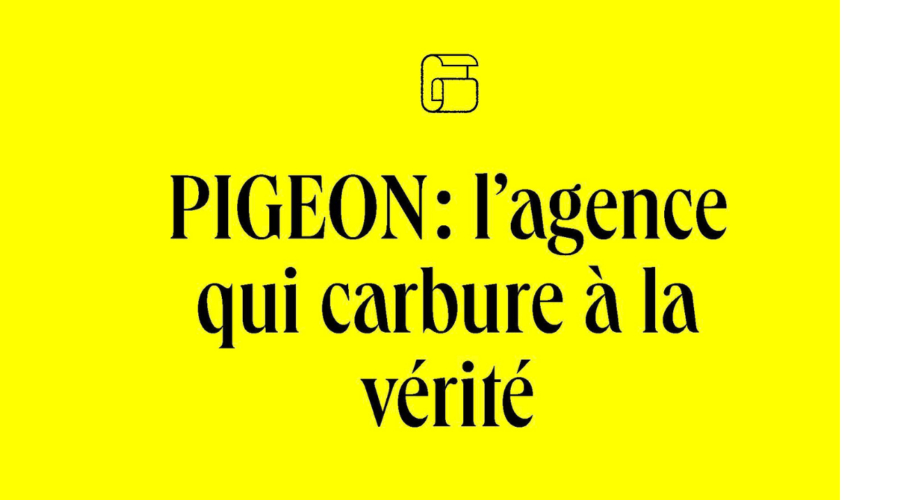PIGEON Featured in Grenier: The Agency Fueled by Truth
We are honoured to have been featured in Grenier’s latest issue where we share our approach as an agency on …

Last January, as part of the DUX conference day, we demonstrated the importance of brand transparency. With the pandemic, transparency has become crucial. Why? To ensure the trust and survival of brands.
Younger generations were already calling for big changes, such as improved diets and concrete actions by companies to fight climate change. Generation Z proudly wants to consume brands that will have a direct impact on our future. This generation is very influential. Z’s and Y’s combined will represent more than half of active consumers in less than 10 years.
Many consumers are ready to change brands – if they know more about a brand’s way of doing things, its values, and its sources of supply – all that and more, for their health and safety. At the end of 2019, the responsible consumption barometer survey cited that 88% of Quebecers expected brands to act as agents of change, and not our governments.
Increased attention to health has changed shopping behaviors;
Health before the pandemic focused on physical, emotional and mental well-being. Consumers now have increased concerns just to be safe and alive. Where, when and how purchases are made have changed. Many are looking for greater ease in obtaining their food. The time spent in the grocery store is cut short. There is now less room for discovery. Companies are forced to improve their offerings in terms of products and processes. It is imperative that your products and brands are seen and recognized in stores, and more so on online shopping platforms. Relationships with brands have changed drastically in the space of a few weeks – and it will not come back to the way it was before.
Transparency, a necessity to build trust;
The biggest challenge is to reassure consumers. Worry and lack of confidence are major barriers to spending right now and are playing a bigger role in the lives of consumers. Consumer confidence has become the most important buying driver. Ask yourself: are we communicating the right things to make our consumers trust us? If not, you have to act quickly and rethink your model, your way of doing things, your sources of supply, etc.
The following data collected during confinement allow us to understand the importance that Canadians place on trust:
– 57% of Canadians turn to well-known brands they trust;
– 25% of consumers say they would pay more for products from companies they trust;
– 71% of Canadians will permanently lose faith in brands if they put their own profits before the actions they take on behalf of our communities, our society.
Following these observations, we share three avenues for reflection and action:
1. (Re) define your consumers’ expectations
We owe it to ourselves to take a fresh look at our consumers and to try to understand them even better. Several profiles have changed. Do they shop the same, what do they buy and what can they afford? A large portion of consumers experience emotional and financial difficulties.
Brands must show empathy and offer meaningful and credible solutions. Recognize the new mindset of consumers. Understand new purchasing priorities and obstacles. Innovate taking into account new consumption habits. After the pandemic, some routines will resume (like shopping for groceries), some may change forever (like hotel check-in), and others will be reborn as new norms and ways of doing things (like family dining on Zoom).
2. Review your communication priorities
Maintaining consumer confidence requires adapting your strategies. Almost 9 in 10 consumers want brands to communicate about how they will help people cope with the challenges of the pandemic.
This means realigning your priorities:
– Embody the purpose of your brand, your values, your convictions;
– Demonstrate honesty and integrity. Be oriented towards clear and precise objectives in your actions;
– Put the competition aspect aside. Form alliances with partners or competitors to pool resources and make life easier for consumers;
– Help people meet challenges with new packaging products, formats and features.
3. What you do will build loyalty to your brand, not what you say
The COVID-19 situation has changed the emotional relationship with consumers. People favour companies that take action. A large majority (84%) of consumers want brands to use their media channels to create a sense of community and social support. This means taking action to create greater emotional loyalty. Use in-store and online channels to help and guide. The focus on empathy and concrete actions will change preferences and brand affinity. More than ever, be proactive. Anticipate new needs.
Communicate on how you support and protect your employees and consumers. Reassure to reduce anxiety. Share your goals and progress. Be flexible and be open to facts and unknowns. Create your own sense of trust and help consumers make the most of their current reality.
Failure to be transparent will have serious consequences
Trust in your brand needs to be solidified. Transparency can no longer be seen as a corporate weakness. Viable brands in the new reality are those that are meaningful, genuine and authentic, because transparency is no longer an option, it is a necessity.
We are honoured to have been featured in Grenier’s latest issue where we share our approach as an agency on …

For 46 remarkable years, Thomas Pigeon has been at the helm of Pigeon, one of Canada’s most esteemed brand building …

In the heart of Toronto, amidst the vibrant energy of collaboration, our management team got together for a photoshoot that …

